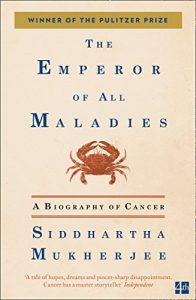Taken to its logical extreme, the cancer cell’s capacity to consistently imitate, corrupt, and pervert normal physiology thus raises the ominous question of what “normalcy” is. “Cancer,” Carla said, “is my new normal,” and quite possibly cancer is our normalcy as well, that we are inherently destined to slouch towards a malignant end. Indeed, as the fraction of those affected by cancer creeps inexorably in some nations from one in four to one in three to one in two, cancer will, indeed, be the new normal—an inevitability. The question then will not be if we will encounter this immortal illness in our lives, but when.”
Cancer has been with humankind for ever. Our knowledge of it, not so long.
This book, as the title implies, is a “Biography of Cancer”, looking at history of diagnoses, treatment and understanding from ancient time – from Imhotep’s clinic in Egypt in 2500 BC, through to the date of the books completion in 2010. It’s a long book – 460 pages – and comprehensive, but not overly medicalised as it looks at culture as much as medicine. For an understanding of where we are now, how we got here, and where we may go, it does well.
The “war on cancer” is portrayed as one against a malevolent and deceptive enemy; an enemy who never stands still and changes form and presentation in the subtlest of ways. An enemy who lays dormant and awaits the time to strike. An enemy who hides and reappears. An enemy of reinvention. The author takes us on a journey though this war, and the battlegrounds, losses and victories to date. Realism and optimism are weaves together.
On one level it’s an easy, albeit long read. In another it’s a difficult read when you contextualise the human costs, and suffering.
It’s a book I would recommend cautiously to anyone with an interest in the area, but be aware it may be triggering.

